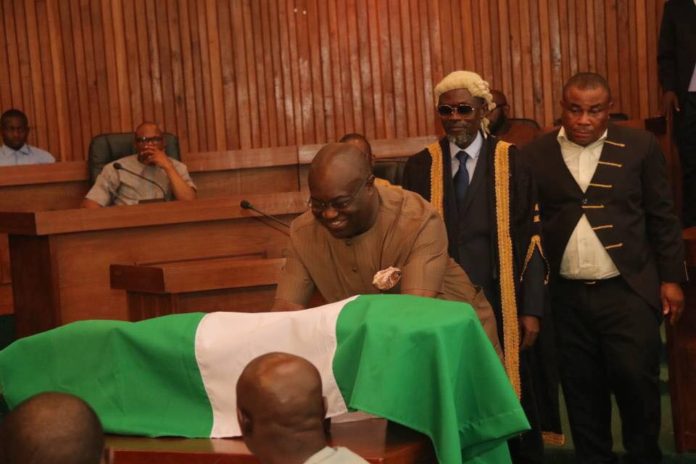By Onwuka Chimezie
The Judiciary is seen as an important part of the Government as it is saddled with the responsibility of ensuring that the laws of the land are adhered to, And For a judiciary to be effective, one of the key concepts is that it has to be independent. The 1999 Constitution has attempted to give life to these concepts by creating certain provisions specifically to ensure the independence of the judiciary. This has to do with the process for appointment and removal of judges.
The Recent Recommendation of Hon Justice Onuoha Arisa Kalu Ogwe by the National Judicial Council to the Abia State Governor Dr Okezie Ikpeazu for Appointment to fill the Lacuna as an Acting Chief Judge of the state pending final resolution on the judicial crisis in the state has again raised the dust of Controversy following the Governor’s refusal to acquiesce and accept The recommendation of the National Judicial Council and the refusal of the state House of Assembly to confirm the recommended person.
As this Dramatic screenplay continues, then the all-powerful Principle of DURA LEX SED LED wouldn’t seize to come to play,, IT is a principle of Law Which states that the Law is Harsh But its harshness or rigidity doesn’t stop the law from being What it is.
Section 271 (1) of the Constitution of Nigeria 1999 as Amended has charged the National Judicial Council With the responsibility of recommending to the Governor candidate for appointment into the office of the state’s Chief Judge subject to confirmation of the appointment by the state House of Assembly. And the National Judicial Council does not owe a state Governor any explanation for its choice in recommending any candidate for appointment as the Chief judge of the state.
The National Judicial Council is also not bound to recommend the Candidate preferred by the Governor for the position of the state’s Chief judge.
An Appellate court of Nigeria had Abinitio Established a Stare Decisis- A Precedent on the SUPRA between the Rivers State Government (Rotimi Amaechi) And the National Judicial Council. The then Governor Rotimi Amaechi had Suo-Motu preferred his candidate for the position of the state’s Chief Judge While the National Judicial Council had considered Another Judge more suitable for the position – Amaechi Who Neglected the statutory Powers of the National Judicial Council Went Ahead to swear in his preferred Candidate without the Judge being Nominated for the position by the National Judicial Council.
The Appellate court in an unanimous Ruling Held that the recommendation of a candidate to the Governor for appointment by the National Judicial Council is not strange to the Constitution Which in it’s section 271 (1) provides that the appointment of a person to the office of Chief judge of a state shall be made by the Governor on the recommendation of the National Judicial Council.
So The Abia State Governor’s Refusal to appoint the Nominated Candidate by The National Judicial Council And the Abia State House of Assembly’s Refusal to confirm the said candidate is not just utterly wrong, It also impugns the supremacy of the Constitution and worthy of arousing irresistible Chaos between the three Arms of Government in the state.
But If the Governor or the house of Assembly insists that their preferred Candidate be Sworn in without the National Judicial Council’s Recommendation then I can Proudly say that it is a scenario of illegality when the Governor or Anybody can just assume power it does not have under the law; this automatically leads to anarchy.
My Candid Opinion is that Whosoever is ill Advising the Governor at this point should Face him With the reality by Elucidating and properly shed light upon What the Law Says concerning the appointment process of the state’s Chief Judge and judges in Nigeria.
I STAND TO BE CORRECTED!!!
Mezie,A Student of Law wrote from Umuahia
